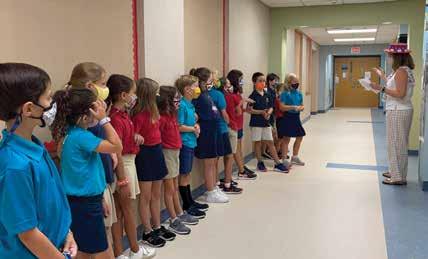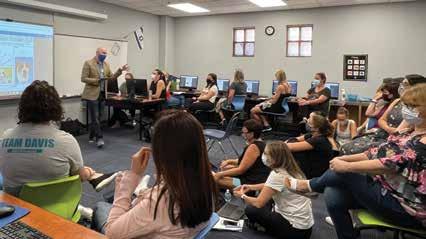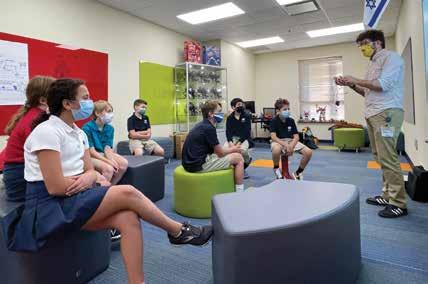
2 minute read
Learning C mmunity
PROFESSIONAL DEVELOPMENT
ASlifelong learners, educators at The Davis Academy enjoy vibrant professional development throughout the year. The approach to professional development is multi-layered in order to target a variety of topics and appeal to different learning styles. With external trainers, in-house sessions led by our own faculty, and relevant faculty learning events throughout the year addressing a variety of topics, professional development is uniquely meaningful to our learning community.
Advertisement
At the launch of the 2021-2022 school year, we hosted three important intensive training sessions for our faculty. First, all Mechina through 2nd grade teachers and teaching assistants participated in a 10-hour course on reading instruction based on the Orton-Gillingham Approach, geared to benefiting all readers. The O-G Approach is a direct, explicit, multi-sensory, structured, sequential, diagnostic, and prescriptive way to teach literacy when reading, writing, and spelling. Our 3rd- 8th grade faculty engaged in a training on executive functioning, led by Scott Hamilton, PsyD, and Tamara Hamilton, LCSW. Our faculty learned how the brain develops over time and were given overviews of specific executive functions, such as working memory, task initiation and processing speed. In addition, they gained knowledge of global strategies to address weaknesses in executive functioning within the classroom setting. Lastly, all Lower and Middle School faculty participated in a SMART Technologies training learning how to increase student engagement with the new
Lumio. This innovative software works in conjunction with our SMARTboards.
At the onset of the school year we also launched a professional development menu in order to personalize ongoing learning so that we are meeting our teachers where they are to address their target areas for growth. Teachers selected from four major topics: educational technology to encourage more comfort using digital tools to support the learning in the 21st century, behavior management to ensure the work flow continues harmoniously with the ability to address different behavioral situations, teacher leadership to encourage the growth and development of teacher leaders, which can be modeled in the classroom toward student leadership, and finally, mental health so that we are well equipped to appropriately support the social and emotional needs of our students and teachers.
Once their topic of interest is selected, participants choose from a curated list of resources that will best support their learning style. The cohorts come together to share and discuss what they learned and the questions that arose in their independent studies. A second component to the professional development menu is to observe two or more colleagues to discover best practices. And finally, the third component of the menu includes an external activity in which teachers participate in a relevant webinar, conference, or other form of learning that will best meet their needs. These include the Atlanta Area Technology Educator summits, national conferences, as well as presenting to peers at other area schools.

Throughout the year, we incorporate professional development into our afterschool faculty meetings so that again, we are well-equipped to address the current needs of our student body. The first faculty meeting of the year highlighted how we instill our Jewish values into our teaching and learning. Our second faculty meeting addressed the ways in which we can support non-binary and gender fluid students with an educational program focused on terminology and inclusivity. We continue to host relevant faculty events throughout the year on a variety of topics. Each of these professional development opportunities positively impacts our learning climate. We learn by not only looking inward but also by exploring the external educational landscape. We will continue to do what is best for our students as we invest in our community’s personal and professional growth and development.







